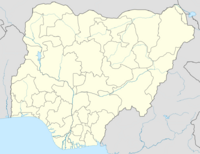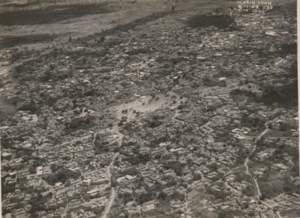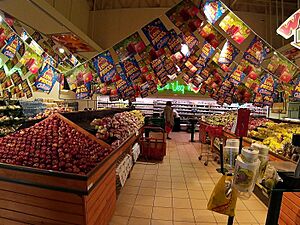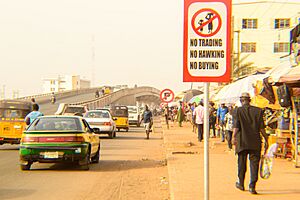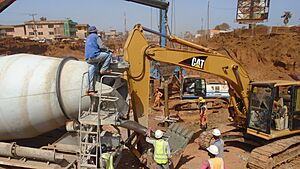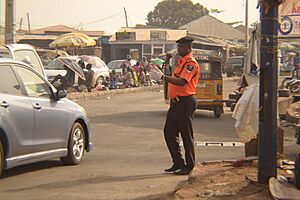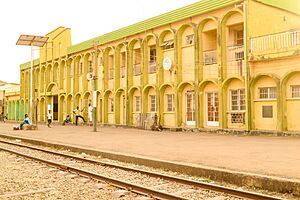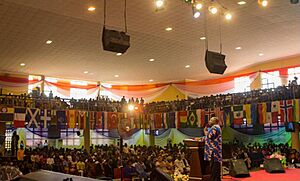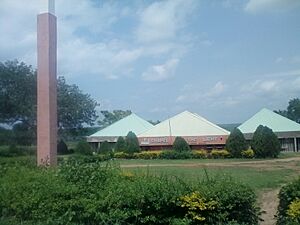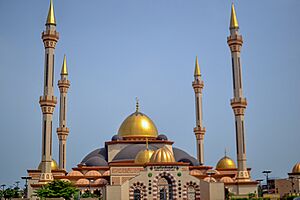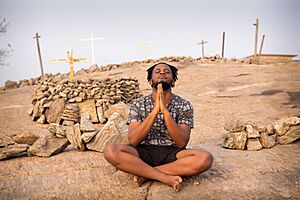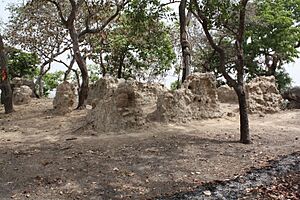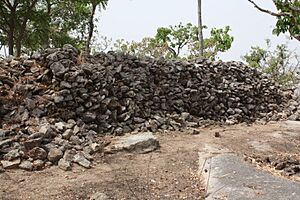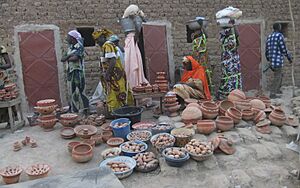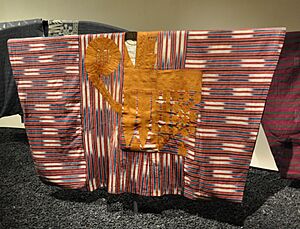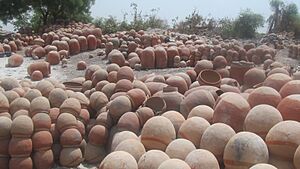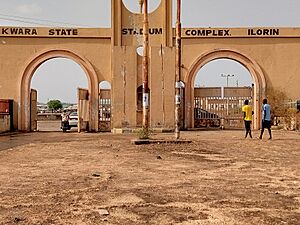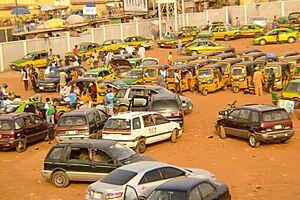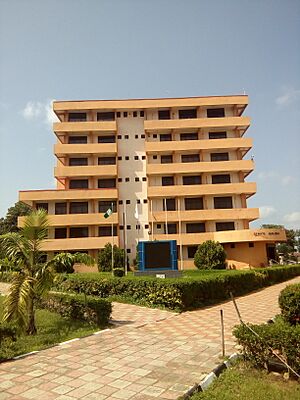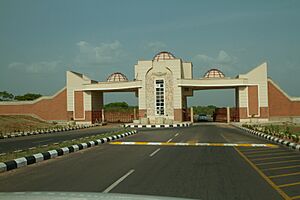Ilorin facts for kids
Quick facts for kids
Ilorin
|
|
|---|---|
|
Metropolis
|
|
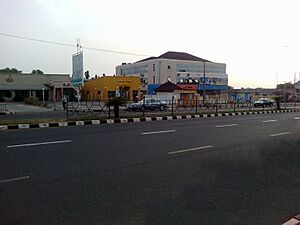
Ahmadu Bello Way in Ilorin
|
|
| Nickname(s):
Il-City
|
|
| Country | |
| State | Kwara |
| LGA(s) | Ilorin East Ilorin South Ilorin West |
| Area | |
| • Metropolis | 765 km2 (295 sq mi) |
| Population
(2006 census)
|
|
| • Metropolis | 777,667 |
| • Estimate
(2011)
|
908,490 |
| • Rank | 7th |
| • Density | 1,188/km2 (3,080/sq mi) |
| • Metro | 1.5 million (estimate) |
| Time zone | UTC+1 (WAT) |
| Climate | Aw |
Ilorin is the capital city of Kwara State in Nigeria. It is located in the North-central part of the country. Even though many Yoruba people live here, it is called a North-central state because of its traditional emirate system of rule. In 2006, about 777,667 people lived in Ilorin. This made it the 7th largest city in Nigeria at that time.
Contents
History of Ilorin
Ilorin was started by the Yoruba people around 1450. The Yoruba are one of the three biggest ethnic groups in Nigeria. It became an important military base for the old Oyo Empire. Later, a traveling Islamic teacher named Shehu Alimi took control of the city. He spread Islam there.
In 1897, the Royal Niger Company took over Ilorin. By 1900, it became part of the British colony of Northern Nigeria. The traditional ruler, called the emir, still had ceremonial duties. Today, Ilorin still has a strong Islamic influence. But many Christians also live there, especially people who have moved from other parts of Nigeria.
In the late 1700s, Ilorin was founded by Yoruba people. It became a kingdom that was connected to the Oyo Empire. In 1817, a military leader named Afonja led a rebellion. This rebellion broke the unity of the Oyo Empire. Mallam Alimi, a Fulani man, helped Afonja. Fulani and Hausa warriors and slaves also helped.
Afonja was increasingly controlled by the Muslim Fulani. After Afonja was killed, Alimi's son, Abd al-Salam, became the emir of Ilorin around 1829. He promised loyalty to the Sokoto caliphate. As a Muslim emirate, Ilorin took over several towns in Yorubaland. It also destroyed the Oyo capital, Oyo Ile, in 1837. Abd al-Salam tried to expand his rule towards the sea. But he was stopped by the Ibadan army at Oshogbo in 1840.
Throughout the 1800s, Ilorin was a big trading center. Goods were traded between the Hausa people in the north and the Yoruba people in the south. Ilorin strongly resisted British rule. But in 1897, the British Royal Niger Company army arrived. Ilorin then accepted British control. In 1900, Ilorin emirate was the only part of Yorubaland included in the Northern Nigeria Protectorate. This area later became Kwara state in 1967.
People of Ilorin
Most people living in modern Ilorin are Yoruba people. However, the traditional ruler of the city has a Fulani family background.
Sports in Ilorin
Ilorin has a large stadium that can hold 18,000 people. It is home to two professional football teams. Kwara United F.C. plays in Nigeria's top football league. ABS FC plays in the second division.
The city also has the only standard baseball field in West Africa. Ilorin has hosted many national handball competitions too.
Business and Trade
Kwara State, where Ilorin is located, was created in 1967. Since then, the state has worked to develop its economy. Much of this development has come from the Nigerian government.
The state has a lot of rich agricultural land. It also has many natural resources. These include limestone and dolomite at Oreke. There is also kaolin and clay near Ilorin. Pure gold is found in Kaiama, and valuable tantalite in Iporin.
In the past, Kwara State had only a few big factories. These included Global Soap and International Tobacco Company. Different governments have tried to bring more businesses to the state.
Because of these efforts, Ilorin has become a major center for processing cashew nuts in Nigeria. Olam International built Africa's largest cashew processing plant here. This factory processes 100 metric tons of cashews every day. It also provides jobs for over 2000 people.
Newer industries in Ilorin include Dangote Flour Mills. There are also pharmaceutical companies like Tuyil and Rajrab. Other businesses include KAMWIL, Golden Confectionate Food Industries, and Chellaram Motor-Cycle Assembly plants.
Climate
Ilorin has a tropical savanna climate. This means it has a wet season and a dry season. The city gets between 990.3 and 1318 millimeters (39 to 52 inches) of rain each year.
The highest temperatures in Ilorin are usually between 33 and 37 degrees Celsius (91 to 99 degrees Fahrenheit). March is typically the hottest month. Over the years, both the lowest and highest temperatures have increased. The amount of moisture in the air, called relative humidity, has also gone up. Winds usually blow from the southeast to the northeast.
| Climate data for Ilorin (1991–2020) | |||||||||||||
|---|---|---|---|---|---|---|---|---|---|---|---|---|---|
| Month | Jan | Feb | Mar | Apr | May | Jun | Jul | Aug | Sep | Oct | Nov | Dec | Year |
| Mean daily maximum °C (°F) | 34.0 (93.2) |
35.8 (96.4) |
36.1 (97.0) |
34.4 (93.9) |
32.4 (90.3) |
30.8 (87.4) |
29.3 (84.7) |
28.7 (83.7) |
29.7 (85.5) |
31.4 (88.5) |
33.8 (92.8) |
34.1 (93.4) |
32.5 (90.5) |
| Daily mean °C (°F) | 26.0 (78.8) |
28.1 (82.6) |
28.3 (82.9) |
28.1 (82.6) |
27.0 (80.6) |
25.5 (77.9) |
24.5 (76.1) |
24.5 (76.1) |
24.6 (76.3) |
25.6 (78.1) |
26.2 (79.2) |
25.7 (78.3) |
26.2 (79.2) |
| Mean daily minimum °C (°F) | 19.7 (67.5) |
22.3 (72.1) |
23.7 (74.7) |
23.6 (74.5) |
22.8 (73.0) |
22.1 (71.8) |
21.8 (71.2) |
21.4 (70.5) |
21.5 (70.7) |
21.7 (71.1) |
21.3 (70.3) |
19.4 (66.9) |
21.8 (71.2) |
| Average precipitation mm (inches) | 5.7 (0.22) |
8.5 (0.33) |
42.0 (1.65) |
110.0 (4.33) |
194.9 (7.67) |
202.7 (7.98) |
175.7 (6.92) |
169.2 (6.66) |
297.3 (11.70) |
176.3 (6.94) |
13.9 (0.55) |
5.5 (0.22) |
1,401.7 (55.19) |
| Average precipitation days (≥ 1.0 mm) | 0.4 | 0.7 | 2.6 | 6.3 | 10.7 | 11.6 | 10.7 | 9.2 | 16.0 | 10.3 | 0.9 | 0.4 | 79.7 |
| Average relative humidity (%) | 55.2 | 57.1 | 67.8 | 76.8 | 81.6 | 84.7 | 86.2 | 86.8 | 86.7 | 84.0 | 71.9 | 59.9 | 74.9 |
| Mean monthly sunshine hours | 210.8 | 210.0 | 217.0 | 204.0 | 220.1 | 189.0 | 136.4 | 117.8 | 132.0 | 195.3 | 222.0 | 226.3 | 2,280.7 |
| Mean daily sunshine hours | 6.8 | 7.5 | 7.0 | 6.8 | 7.1 | 6.3 | 4.4 | 3.8 | 4.4 | 6.3 | 7.4 | 7.3 | 6.3 |
| Source: NOAA (mean temperature, sunshine 1961–1990) | |||||||||||||
Getting Around Ilorin
Ilorin has a good public transport system within the city. The main roads are well built.
There are three main ways to travel around the city. The most common are regular taxis. You can also rent cars from major hotels. Another popular option is commercial motorbikes, called "Okada". More recently, commercial tricycles, known as "Keke NAPEP" or "Keke," have become common. Ilorin taxis are painted yellow and green.
Ilorin's central location makes it easy to reach from all over Nigeria. You can travel by air, road, and rail. The state has good roads, rail lines, and an airport. These connect Ilorin to other important cities in Nigeria. Traveling around Ilorin is quite cheap, costing as little as one hundred naira.
There are daily commercial flights to and from Ilorin International Airport. Airlines like Arik Air and Overland Airways fly here. The airport has also been updated to handle international cargo.
Ilorin offers reliable road transport services to many states. These include Lagos, Ogun, Osun, Ondo, Oyo, Ekiti, Kogi, Niger, Kaduna, and Plateau States. You can also travel to cities like Onitsha, Port Harcourt, Abuja, and Aba.
A major expressway to Ibadan is currently being built. Ilorin also has a railway and highway from Lagos. These roads meet in the city.
Culture in Ilorin
Religion in Ilorin
Ilorin is a city where many cultures meet. People from different ethnic groups live here. These include the Yoruba, Fulani, Nupe, Bariba, Kanuri, Igbo, and Hausa. There are many Christians and Muslims. Many cultural events, often with religious meaning, happen throughout the year.
Christianity in Ilorin
Ilorin has many old and new churches. These churches have small to large groups of followers. Some well-known churches include the Catholic Church, Cherubim and Seraphim, Anglican, and Methodist churches. Others are Celestial Church of Christ, Evangelical Church Winning All (ECWA), Emmanuel Baptist Church, First Baptist Church, and Zion Baptist Church. Popular Pentecostal churches include Redeemed Christian Church of God, The Gospel Faith Mission International (Gofamint), Deeper Life Church, and Living Faith Church. Seventh-day Adventists also have a presence here. Many Christian churches in the state started schools. They also brought new ideas that Muslim schools quickly adopted.
There has been a Latter-day Saint group in Ilorin since 1992. More Latter-day Saint groups were started in Ilorin in 2016.
History of the Central Mosque
The first central mosque in Ilorin was built in 1820. It was located in the Agbarere Area. Sheik Imam Muhammad Munab'bau led its establishment. In 1835, another central mosque was built at Idi-Ape. This was during the time of Abdus-salam, the first Emir of Ilorin. However, after more than 100 years, this mosque became too small. The Muslim population in the city had grown a lot.
So, in 1974, the ninth Emir of Ilorin, Alhaji Zulkarnaini Gambari, decided to build a new central mosque. He asked Grand Mufti Alhaji Mohammed Kamal-u-deen and Abubakar Sola Saraki to help raise money and manage the building.
The Present Ilorin Central Mosque
On April 30, 1977, the foundation for the new mosque was laid. The Emir of Gwandu did this on behalf of Sultan Abubakar III. The new Ilorin Central Mosque was finished and officially opened in 1981. The former president, Alhaji Shehu Shagari, opened it. The mosque was later renovated and expanded in 2012. It now looks very grand. The newly decorated mosque was opened again on December 14, 2012.
The "New" Ilorin Central Mosque Design
Plans to update and improve the Central Mosque began in 2007. Alhaji Ibrahim Zulu Gambari, the eleventh Emir of Ilorin, started a committee. Abubakar Bukola Saraki, the former Governor of Kwara State, also helped. They brought in experts from around the world to help with the design. These experts came from Saudi Arabia, the United Arab Emirates, and Nigeria.
The mosque now has 99 domes of different sizes. They are 75 feet above the floor. The largest dome has a gold finish. The four big domes around it are green and light up. The mosque's shape looks like a pyramid with a square base. It has four minarets, which are tall towers, each 150 feet high. All the old domes and minarets were repaired and covered with marble. The inside and outside are covered with special marble. The expanded courtyard uses heat-absorbing granite. The doors and windows were replaced with new designs.
Arts and Tourism
Ilorin has many interesting places to visit. One is the Sobi Hill. People say this hill protected the local people during old tribal wars.
The Okuta Ilorin is a special stone. It is located in the Asaju's compound. This is the stone that Ojo Isekuse, one of the city's founders, used to sharpen his metal tools.
Its full name was "Okuta ilo irin," which means "stone for sharpening metals." The city of Ilorin got its name from this stone. In the past, people worshipped this stone and offered sacrifices to it.
Making Pottery is a big business in Ilorin.
The city has the largest traditional pottery workshops in Nigeria. You can find them in areas like Dada, Eletu, Okekura, Oloje, Abe Emi, and Ita Merin.
The traditional textile industry is also very active in Ilorin. In many parts of the city, people make aso-oke. This is a type of fabric woven by hand on simple looms.
Traders and fashion designers buy aso-oke from Kwara State and other parts of Nigeria and abroad.
The cultural center in Ilorin is home to the Kwara State Council for Arts and Culture. It has a performing group and a gallery. The gallery displays artworks and old objects. You can also buy Souvenirs that show the local culture and history.
Metropolitan Park is a fun place to relax. It is located on Unity Road. The Kwara State Stadium Complex has a large swimming pool with diving facilities.
There is also a special baseball park in the Adewole area of the city.
The Esie Museum is very important to Nigeria's many cultures.
2019 Flood Event
On September 18, 2019, heavy rain caused a flood in Ilorin City. This flood damaged valuable items worth millions of naira. The flood started around 5:00 PM and lasted until about 9:00 PM.
Many people living in affected buildings could not leave their homes until the next afternoon. This was because water had filled their buildings.
Pollution Concerns
Ilorin, like many cities, faces challenges with pollution. Sometimes, you can see piles of trash on major streets. This happens when the Kwara State Waste Management agency cannot clear the garbage bins. The bins, placed in different spots, become full. This forces people to dump trash by the roadside. This can cause bad smells and might lead to the spread of diseases.
Education in Ilorin
Ilorin is home to several universities. These include the University of Ilorin, often called Unilorin, and Al-Hikmah University. The Federal Agricultural and Rural Management Training Institute, which has a research farm, is also near the city. Ilorin also has colleges for teacher training and a vocational trade school. For health services, there are government, private, and religious hospitals. There is also a nursing home for older people.
Other educational institutions in Ilorin include:
- International Aviation College, Ilorin
- Emmanuel Baptist College
- Kwara State College of Arabic and Islamic Legal Studies, Ilorin
- Kwara State College of Education, Ilorin
- Kwara State Polytechnic
- Unilorin Secondary School
- Agriculture and Rural Management Training Institute
- Muhyideen College of Education
- Ansarul Islam Secondary School, Ilorin
- Army Day Secondary School, Sobi Barrack, Ilorin
- Baboko Community Secondary School, Ilorin
- Bishop Smith Memorial College
- Cherubim and Seraphim College, Ilorin
- Federal Government College, Ilorin
- Federal Training Center, Ilorin
- Government Day Secondary School, Karuma, Ilorin
- Government Girls Day Secondary School, Ilorin
- Government Secondary School, Adeta, Ilorin
- Government Secondary School, Ilorin (Founded in 1914)
- Ilorin Grammar School, Ilorin
- IQRA College, Ilorin
- Michael Imoudu Institute for Labour Studies
- Mount Carmel College, Ilorin
- National Centre for Agricultural Mechanization
- Saint Anthony's Secondary School, Ilorin
- School of Nursing and Midwifery, Ilorin
- Socrates College, Ilorin
- U.M.C.A High school, Ilorin
- United Missionary Theological Seminary
- Ilorin Comprehensive High School (ICOHS)
- Islamic College Ilorin (ICI)
Images for kids
See also
 In Spanish: Ilorin para niños
In Spanish: Ilorin para niños
 | Madam C. J. Walker |
 | Janet Emerson Bashen |
 | Annie Turnbo Malone |
 | Maggie L. Walker |


